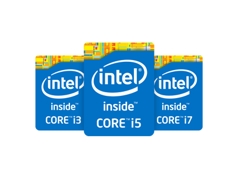
Come era sostanzialmente prevedibile e, soprattutto, preventivabile, il termine del supporto per Windows XP da parte di Microsoft, avvenuto lo scorso 8 aprile 2014, e dunque a distanza di oltre 12 anni dal lancio di tale Sistema Operativo, sta determinando un interessante incremento della domanda di nuovi PC nel mercato aziendale, o business.
Questo trend è stato confermato dalla stessa Intel, ovvero dal principale produttore al mondo dei chip, o processori, che sono alla base di ogni PC. In accordo al contenuto del comunicato stampa che mi mostriamo di seguito in lingua originale, infatti, Intel ha reso noto di aver rivisitato la stima del suo fatturato per il secondo trimestre del 2014, che termina il prossimo 30 giugno.
Più in dettaglio, il chip maker statunitense punta a conseguire un fatturato pari a 13.7 miliardi di dollari, con una oscillazione di più o meno 300 milioni di dollari, a fronte di una stima iniziale pari a 13 miliardi di dollari con una oscillazione di 500 milioni di dollari.
Secondo Intel, le aziende hanno deciso di gestire la fine del supporto per Windows XP mediante l'acquisto di nuovi PC, il cui hardware sia pienamente compatibile con gli OS Microsoft più recenti, da Windows 7 a Windows 8.1. Ciò naturalmente determina un incremento del volume di processori forniti agli OEM e, in ultima analisi, del fatturato.

[Immagine ad alta risoluzione]

As a result of stronger than expected demand for business PCs, Intel Corporation now expects second-quarter revenue to be $13.7 billion, plus or minus $300 million, as compared to the previous range of $13.0 billion, plus or minus $500 million. The company is forecasting the mid-point of the gross margin range to increase by 1 point to 64 percent, plus or minus a couple of percentage points, driven mostly by higher PC unit volume. R&D plus MG&A spending is expected to be approximately $4.9 billion, $100 million higher than the prior expectation of approximately $4.8 billion, driven largely by revenue- and profit-dependent items. The tax rate for the second quarter is expected to be 28 percent as compared to the prior expectation of 27 percent due to higher profits in higher tax jurisdictions. The expectation for second-quarter depreciation remains unchanged.
Intel now expects some revenue growth for the year as compared to the previous outlook of approximately flat. The change in outlook is driven mostly by strong demand for business PCs. The company will provide additional commentary on all business segments when it reports second-quarter earnings on July 15. The full-year gross margin percentage is now expected to be in the upper half of the previous range of 61 percent, plus or minus a few percentage points, driven mostly by expected improvements in unit cost and volume. A new full-year gross margin range will be provided on July 15. Full-year R&D plus MG&A spending is expected to be $19.2 billion, plus or minus $200 million, higher than the prior expectation of $18.9 billion, plus or minus $200 million, driven mostly by revenue- and profit-dependent items. The tax rate for each of the remaining quarters of 2014 is expected to be 28 percent, as compared to the prior expectation of 27 percent due to higher profits in higher tax jurisdictions. The expectations for full-year depreciation and capital spending are unchanged. No other guidance from the April 15 earnings release remains in effect.
Business Outlook
Intel's second-quarter Business Outlook was originally published in the company's first-quarter 2014 earnings release, available at intc.com. The company is scheduled to report its second-quarter financial results on July 15.
Intel's updated Business Outlook does not include the potential impact of any business combinations, asset acquisitions, divestitures, strategic investments and other significant transactions that may be completed after June 12. Intel's updated Business Outlook is posted on intc.com and may be reiterated in public or private meetings with investors and others. The updated Business Outlook will be effective through the close of business on June 17, unless earlier updated. Intel's Quiet Period will start from the close of business on June 17 until publication of the company's second-quarter earnings release, scheduled for July 15. During the Quiet Period, all of the Business Outlook and other forward-looking statements disclosed in the company's news releases and filings with the SEC should be considered as historical, speaking as of prior to the Quiet Period only and not subject to an update by the company.
Source: Intel Press Release
Links



